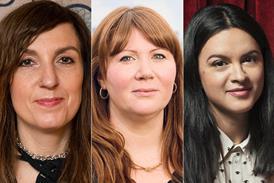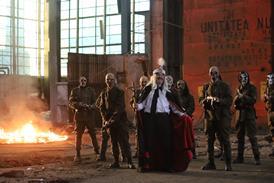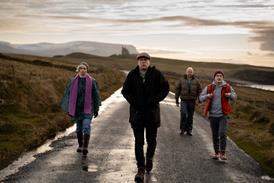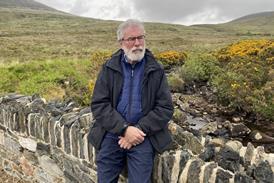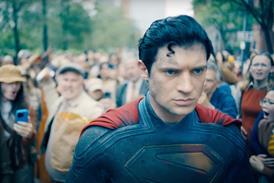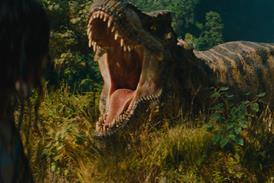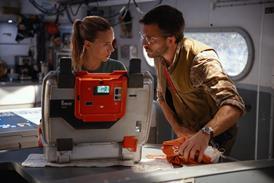A family celebration proves a melting pot for sisterly tension in the final part of Ramon and Silvan Zurcher’s animal trilogy
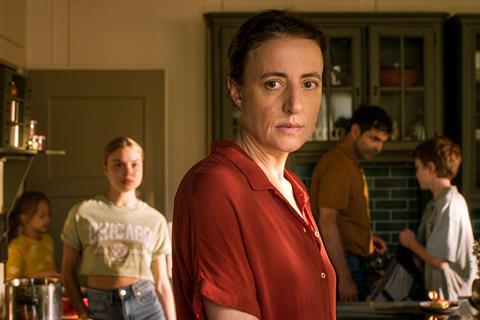
Dir/scr: Ramon Zurcher. Switzerland. 2024. 117mins
The final part of Zurcher brothers’ ‘animal trilogy’ exploring human togetherness is in keeping with its predecessors, The Strange Little Cat and The Girl And The Spider, while also being considerably more ambitious. An often drily comic psychodrama that sings with tension, it ups the ante – and special effects budget – as Swiss writer/director Ramon and his twin, producer Silvan, continue to chart the psychological and, potentially, physical injuries that can stem from abrasive familial relationships.
An often drily comic psychodrama that sings with tension
Broken crockery, metal in a microwave and a vase too close to the edge all hint at a breaking point, but this is also a film of metamorphoses; the fat caterpillars in the kitchen are not the only creatures here that are slowly shifting shape. The brothers’ earlier films both enjoyed extensive festival play and The Sparrow in the Chimney should follow suit after its premiere in Locarno, with its inclination towards horror elements, albeit brief, likely to ensure even more interest.
Birthday party get-togethers are classic cinematic melting pots and the one in motion in the countryside in the Zurchers’ latest is no different. Every sinew in actor Maren Eggert’s body suggests her character Karen was already tightly wound even before she started to get ready for her husband Markus’ (Andreas Dohler) birthday. Karen’s watchful, cookery-loving son Leon (Ilja Bultmann) tenses in her presence, while she and daughter Johanna (Lea Zoë Voss) can’t wait to push one another’s buttons.
Soon they are joined by Karen’s sister Jule (Britta Hammelstein) along with her husband Jurek (Milian Zerzawy), new baby and young daughter Edda (Luana Greco), while Karen’s elder daughter Christina (Paula Schindler) is also en route. The everyday push and pull of familial stress is built on an older bedrock of tension in the house, which stems from the building’s past. It was once owned by Karen and Jule’s parents, passed down along with its turbulent history and tragedy. “It used to be cosier here without mum’s stuff,” Jule tells Karen, her connection to their mother still strained after death.
The one true outsider is Liv (Luise Heyer), who walks the family dog and lives in the cabin that was once the bolthole of Karen and Jule’s mother. A wildcard in this tightly bound pack with secrets of her own, Zurcher’s screenplay uses her to add an extra element of unpredictability.
There may be no spiders here, but the web of connections is laced like an invisible, quivering trap. New rebellions look set to prise open old war wounds, liaisons threaten to be dangerous. Other animals drift in and out; a sea squirt which no longer has the brain to move, a curious dog and a roly-poly rat. Two more creatures get trapped, meeting very different fates, as Zurcher invites us to join the dots between the human and animal kingdoms.
The potential for violence is rooted in the everyday: splashes of blood are joined by sploshes of ratatouille, one knife carves a sweet peach swan, another beheads a chicken. The largely fixed camera employed by cinematographer Alex Hasskerl helps to emphasise the hubbub of the house. We see the various members pass each other in the physically tight confines of the hall, and have an opportunity to drink in the body language as the clan take on various jobs in the kitchen.
The previous two films were set to a high simmer, but here Zurcher fully turns up the heat so there’s no question of whether something will boil over, but a case of what, when and by how much. All the micro-motivations and manipulations of life are present, from the desire to be loved and look after others to the urge to tear down a carefully constructed emotional wall.
Karen and her shifting perspective are key. Zurcher audaciously breaks her free from the domestic in a powerful dreamlike sequence that speaks to her deepest fears and desires, and briefly moves the action into full-blown horror territory, as the previously spare score from Balz Bachmann also amps up. While the writer/director maintains the strong sense of everyday relationships and realism from his previous films, his more ambitious approach pays off to deliver an emotionally volatile portrait of a family in flux, complete with ambiguous motives and unexpected transformations.
Production companies: Zurcher Film
International sales: Cercamon, sebastien@cercamon.biz
Producer: Silvan Zurcher
Cinematography: Alex Hasskerl
Production design: Peter Scherz
Editing: Ramon Zurcher
Music: Balz Bachmann
Main cast: Maren Eggert, Britta Hammelstein, Luise Heyer, Andreas Dohler, Lea Zoe Voss, Milian Zerzawy, Ilja Bultmann, Paula Schindler, Luana Greco




